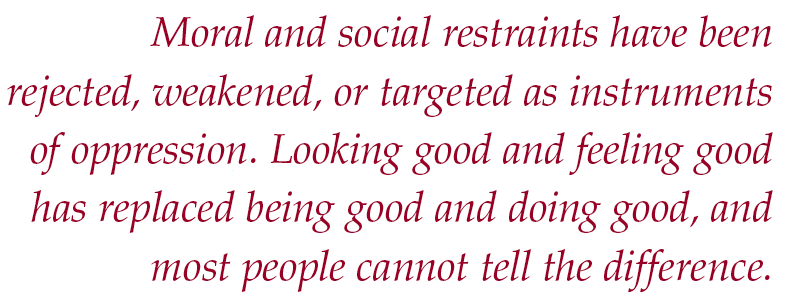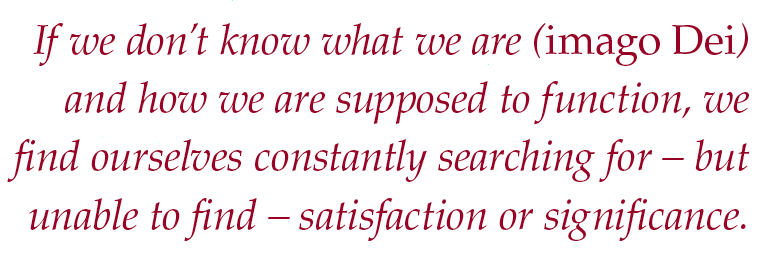Back to series
Two Driving Principles
Idolatrous Options?
Combating Narcissism


Understanding And Dealing With Today's Culture Of Narcissism
Click here to open a Print - Friendly PDF
True faith in Christ demands a change of focus and orientation. The Scriptures envision a life that includes self-renunciation. The heart, and its ordering, is central to this. “Keep your heart with all vigilance,” says Proverbs 4:23, “for from it flow the springs of life” (ESV). The scriptural understanding of the heart’s “fallen” bent or orientation calls us to be careful in monitoring what it is that captivates and then captures our hearts.
As Ken Boa often points out, in line with Augustine long before him, the central call of Scripture is to love God supremely, to learn to love him correctly, and to love others practically. The Christian life is a love story, and the struggle of existence, if you will, is over who, what, and how we love (see Matt. 22:36–40; John 13:34–35). St. Paul reminds the young Timothy that the goal of his ministry is love “that issues from a pure heart and a good conscience and a sincere faith” (1 Tim. 1:5 ESV).
In light of this, and other clear teachings of Scripture, the exhortation of the Proverbs to keep or guard our hearts is a serious warning and a vital, timeless concern.
Luke records Jesus’ central teaching in terms of self-denial. “If anyone would come after me, let him deny himself and take up his cross daily and follow me. For whoever would save his life will lose it, but whoever loses his life for my sake will save it” (Luke 9:23–24 ESV; see also Luke 14). As Dallas Willard has pointed out, self-denial is a key element of spiritual formation. With this in mind, let’s consider our cultural moment—its dominant mood and the difficulties it creates for such a vision of discipleship—in light of the Greek legend that tells the tragic story of Narcissus.
A Legendary Mind-Set
Known for his handsome features, Narcissus was oblivious to others; he scorned or ignored the people around him. When someone angrily lashed out, “May he who loves not others love himself,” something like a curse fell on Narcissus: he became fixated by his own reflection in a pool of water.
Gazing in adoration at his own beauty and magnificence, he was unable to hear Echo’s call, until eventually he fell into the pool and drowned. Narcissus died a lonely, self-absorbed death, consumed in the end by his own self-infatuation.
As we move from ancient mythology to modern times, we note that the past two hundred years in Western cultures have shown an increasing focus on the place of the individual, the role of choice, and the “demand” to be personally happy at whatever cost. Moral and social restraints have been rejected, weakened, or targeted as instruments of oppression.
Looking good and feeling good has replaced being good and doing good, and most people cannot tell the difference. We’re told that nothing should hinder the life we want. The endless cycles of “reality TV” shows invite us all to a feast of self-absorbed personalities who live to win no matter what. The outcomes, however, are somewhat suspect.

One result has been what Christopher Lasch famously and controversially called “the culture of narcissism.” We see it in the infantile and self-obsessed characters of popular culture, such as Peter Griffin in Family Guy or Sheldon in The Big Bang Theory. Seinfeld and Friends seem to make a virtue out of the quirkiness of self-absorption.
Writing in the late eighties, Lasch described the dependency produced by this kind of culture. “The narcissist depends on others to validate his self-esteem. He cannot live without an admiring audience. His apparent freedom from family ties and institutional constraints does not free him to stand alone or to glory in his individuality . . . For the narcissist, the world is a mirror, whereas the rugged individualist saw it as an empty wilderness to be shaped by his own design.”1
Lasch further proposes that narcissism is an unhappy condition. “Plagued by anxiety, depression, vague discontents, a sense of inner-emptiness, the ‘psychological man’ . . . seeks neither individual self-aggrandizement nor spiritual transcendence but peace of mind, under conditions that militate against it.” The narcissist turns to therapists, hoping to achieve “the modern equivalent of salvation, ‘mental health.’”2
The narcissist mind-set seems to ask the question, can man live as God?
How does a dictionary of sociology define narcissism? “The dominant personality type of modern society is said to be internally impoverished, fluctuating between exaggerated self-love and self-hatred, consequently needing parasitic relations to reinforce the former; it is unable to tolerate frustration, inadequacy, and strong feelings, due to a lack of ego-development.”3
I believe, particularly in America, that narcissism is the problem of our age. And it leads to other serious problems. Lasch notes several, including chronic boredom, promiscuity, and hypochondria—always looking for a cure.4 I see here what St. Augustine called concupiscence or a permanent rage of “wanting, wanting, wanting.” There are varieties of the manifestation of narcissism.
The church seems to have its share. I think of the person who endlessly “consumes” religious services, seminars, and messages but rarely does anything and commits to little. The preening culture of personality so widely popular is replicated in a mirrored version by our own celebrity fixation with religious leaders.
The culture of narcissism fosters discontent, hunger, and restlessness as a constant condition. The endless stimulus and intentional bombardment of marketing plays into the spirit of the age. Somebody loves you (actually, your money) and has a wonderful plan for your life (resources). Our legitimate needs, longings, fears, wishes, and hopes are studied, analyzed, and utilized as strategies against us.
Even knowing this, many of us still fall prey to the market’s powerful seductions. They are so . . . well . . . so much fun! Just think—if we become happy and content, if we begin to enjoy what we have, to like how we look, to live with less, we may not feel the urge to consume, and as we know, “When the going gets tough, the tough . . . go shopping.”
The Hungry Soul
The notion of a “hungry soul” is a powerful one. C.S. Lewis and G.K. Chesterton were quick to perceive what they saw to be the misfit between modern philosophies, ideas, or ideologies and modern men and women. The patient was being diagnosed with problems that were supposedly reducible to material or social influences alone. People were told they were the result of random forces plus chance and necessity; meaninglessness bellowed in their thoughts, yet their hearts cried for more! This demands that we reflect on the human condition.
 Our cultural moment and its many voices reveal a deep restlessness with what is or how things are. Augustine is a good guide here in describing three types of unhappy people. “The one who seeks what he cannot obtain suffers TORTURE, and the one who has got what is not desirable is CHEATED, and the one who does not seek what is worth seeking is DISEASED.”5
Our cultural moment and its many voices reveal a deep restlessness with what is or how things are. Augustine is a good guide here in describing three types of unhappy people. “The one who seeks what he cannot obtain suffers TORTURE, and the one who has got what is not desirable is CHEATED, and the one who does not seek what is worth seeking is DISEASED.”5
The massively felt discontent of our age, what Colin Gunton expressed in Enlightenment and Alienation, provides Christians with an apologetic point of contact—a bridge.
John Eldredge offers a useful perspective. He talks about “the journey of desire” as “the desire for life as it was meant to be.”6 Eldredge cites Gerald May:
There is a desire within each one of us, in the deep center of ourselves that we call our heart. We were born with it, it is never completely satisfied, and it never dies. We are often unaware of it, but it is always awake . . . Our true identity, our reason for being, is to be found in this desire.7
Our desires are misdirected, relocated, and sadly misguided. At stake are core identity issues. What am I? Why am I here? It speaks to issues of calling, the quest for meaning and purpose in life. The modern world and its media (propaganda system?) have a wonderful plan for your life, unless, that is, you seek the real thing.
If we don’t know what we are (imago Dei) and how we are supposed to function, we find ourselves constantly searching for—but unable to find—satisfaction or significance. The quest has an insistent demand and drives us with relentless energy. That great physician of the soul Blaise Pascal notes that a sign of human greatness is our ability to know that we are miserable. He says: “What can the incessant craving and this importance of attainment mean, unless there was once a happiness belonging to man, of which only the faintest traces remain, in that void which he attempts to fill with everything within his reach?”8
Pascal sees our disordered desires as a symptom of our brokenness and as evidence of a fall from greatness, a focus that Abraham Kuyper also addresses, asking whether the world is in a normal or abnormal condition as we encounter it. Who defines the norm, the standards, or the lines by which we measure? This is a worldview and lifeview issue that has serious consequences.
A Workable Model?
Let’s examine this a bit more closely. One of the tests of a worldview and lifeview is its livability. The “modern” and now the postmodern eras have struggled greatly with finding a workable model for a truly satisfying life. Assured that the past was largely bad and all wisdom lives in creativity, the moment, the “now,” we are left as slaves of our limited horizons. Narcissism is one of the results. The book of Romans charts the path of descent that inevitably follows ignoring, rejecting, or turning from God. Consider the mid-portion of Romans 1.
- Verses 18–20. We see that there is a knowledge of God that is public, that is perceived, what the Reformed tradition refers to as “common grace.” However, this knowledge does not lead where we’d expect or perhaps wish.
- Verses 21–23. Humankind does not “honor him as God” or “give thanks to him,” which would express contingency, dependency, and gratitude. They prefer their own reason or the “reasons” they can find around them (the creation). This is an inward turn.
- Verses 24–25. God therefore gives them over. They can have what they want (and all the consequences
that are entailed). The downward and inward pull takes over and becomes predominant.
However, as beings made in the image of God, they are tormented and left with infinite longings bounded by finite capacities. Desire’s reach is so much greater than life’s confined ability to deliver (without God).
Two Driving Principles
Humans everywhere submit to something as the central guiding or driving principle, or force, for their life. The famous psychiatrist M. Scott Peck is helpful here:
To function decently in this world we must submit ourselves to some principle that takes precedence over what we might want at any given moment. For the religious, this principle is God, and so they will say, “Thy will, not mine be done.” But if they are sane, even the nonreligious submit themselves, whether they know it or not, to some “higher power”—be it truth or love, the needs of others or the demands of reality.9
The contemporary era has preferred Nietzsche over Jesus. The “will to power,” the overcoming hero as the self-created and self-ruled individualist, is the icon of our time. The Old Testament shows a glimpse of this personality type in the wicked king Ahab. In 1 Kings 21 Naboth refuses to sell his vineyard to the greedy Ahab because it is his family’s inheritance and a sale would be contrary to the Mosaic Law. Ahab, unable to secure his desire, goes into a huff like a toddler whose desires are thwarted and rushes home to his bed. His whole world stops because he can’t get what he wants, right away, right now! His submission is to himself and his passion.
We are all submitted to something, the question is, to whom or what?
Idolatrous Options?
Western culture and its analyzers recognize that something is deeply wrong. It is as if there is a destructive social virus, a seed that carries with it its own undoing. The French philosopher Chantal Delsol describes “the individual, supposedly freed from the culture that weighed on him” who:
. . . reflects a false sense of sufficiency: the individual believes himself to be the source of both the questions and the answers, to contain within himself the alpha and omega, and to provide himself with his own points of reference. He wishes to bind himself to others only through a voluntary contract . . . He rejects the bonds that preceded him and any debt to which he has not agreed. 10

Rejecting all bonds and commitments, and restricting obligations, the narcissist wants to be unrestricted in his choices. All outer, external, or inherited (traditions) reference points are lost or simply don’t matter.
The narcissist believes “it’s all about me,” and of course within his worldview and lifeview, what else is there? This frame of mind has vast cultural consequences, because we reap what we sow. We elevate “winners,” and they become a source for emulation. Harold O.J. Brown documents what he describes as “the sensate mentality” that “is interested only in those things, usually material in nature, that appeal to or affect the senses. It seeks the imposing, the impressive, the voluptuous; it encourages self-indulgence.”11
We have seen this in the Wall Street meltdown, in the tragedies of Enron, WorldCom, and a host of others. We saw it in Bernie Madoff and in many others paraded before us as the models of what we should aspire to. Brown expands, “If [this person’s] hunger for pleasures and sensory values is paramount, what can guide and control his conduct towards other men? Nothing but his desires and lusts.”12
This is so perceptive. The once-so-called seven deadly sins become the seven desired intentions. “People no longer recognize their common interests, for their interests have become highly individualistic and selfish . . . Whereas in an ideational or idealistic culture lust was something to be ashamed of, in the sensate world it becomes a reason for boasting.”13 Many today mock morality and praise unlimited self-expression.
The Bible recognizes this phenomenon and names it. It is the cardinal sin of the Bible and the greatest threat that exists to the faith and faithfulness. It is idolatry, here defined by Tim Keller: an idol “is anything more important to you than God. Anything that absorbs your heart and imagination more than God, anything you seek to give you what only God can give.”14
Combating Narcissism
Our culture embraces the diversity of idolatrous options manufactured and served up to us on a regular basis. Narcissism finds a welcome in many hearts. How do we resist? What can we do to face the challenge, choose alternatives, and embrace a different way?
The book of 1 John offers vital light on these questions.
First John 2:15–17 discusses the battle against the “desires of the flesh and the desires of the eyes and pride in possessions.” To combat narcissism, we must think more deeply and act more intentionally in ways that cultivate deeper love of the right kind. Augustine wrote that rightly ordered love or charity (caritas) was the secret of a holy and fulfilling life.
Most believers today would never think this way. They lack the tools to diagnose a problem correctly and to find the necessary spiritual solution. In a culture of narcissism, with churches impacted by its pervasive influence, we need help and practice (disciplines) to learn to love the right things, in the right order, and in the right way. The current trend toward formation and discipleship augurs well in this regard.
 Let me suggest several counterpoints to the press of narcissism. The first would be a clarified sense of identity and calling. First Peter 2:9–12 speaks powerfully to this. So many in the church who live the unexamined life are being “conformed to this world” (Rom. 12:2) because they do not intentionally focus on being “transformed.”
Let me suggest several counterpoints to the press of narcissism. The first would be a clarified sense of identity and calling. First Peter 2:9–12 speaks powerfully to this. So many in the church who live the unexamined life are being “conformed to this world” (Rom. 12:2) because they do not intentionally focus on being “transformed.”
We are not consumers (by definition). We are not mere individuals or some product of a marketing campaign. We are made in God’s image, to worship him, serve him, do his will, and glorify his name.
We are God’s. We are called! As Os Guinness notes: “Calling is the truth that God calls us to Himself so decisively that everything we are, everything we do, and everything we have is invested with a special devotion and dynamism lived out as a response to His summons and service.”15
When considering our call, we need to factor in clarity of purpose, conviction in its implications, and commitment to higher ends.
The second counterpoint would be that of active resistance (1 Pet. 5:8–9), which requires serious attention and intention. We are to be on the alert, “sober-minded” and “watchful” for the adversary. Watching, evaluating, considering—we need to recognize and own that warfare is real and that we are serious targets.
There are many unrelenting forces arrayed against us. The command is to “resist.” We resist also knowing that we are not alone, that others suffer with us that we are part of a community for shared learning and support.
This is why fellowship, small groups, Communion, church life, and prayer are essentials, not options. The lone wolf gets devoured.
Jacques Ellul would call us to “subversive spirituality” as we resist the idols of our time, and we would do well to learn from the moral commitment of men like Alexander Solzhenitsyn, who saw the corruption of the Soviet system, who felt the press to surrender and conform, but who courageously resisted and said, “Let the lie come, but not through me.”
My third counterpoint would be the need to foster an alternative focus (1 Pet. 4:1–3). Being willing to suffer, to be misunderstood, rejected, or shamed because we choose a higher, better, and more biblical way, is a serious step of resistance to narcissism and its encroachments. It takes a more compelling love, a deeper power, a greater affection, to expel the lesser and the lower. We turn outward and upward with definable outcomes through:
- A willing and ongoing surrender to God where “not my will, but thine be done” is the desire of our heart and is modeled continually in the flow of daily life.
- A life of sacrifice and not self-seeking. As missionary martyr Jim Elliot said, “He is no fool who gives what he cannot keep to gain what he cannot lose.” For some of us, perhaps for many of us, we need a serious reorientation of values.
- The choice to serve God by serving others. Jesus served his disciples (John 13). He is our model, our master, and our way. The culture of narcissism bids us to exalt self, pursue our own happiness, and neglect all else. The way of Christ, the way of the Cross, bids us deny self, take up our own cross, and follow Christ. One is a path of tragedy, the other the path of life. May we choose wisely!
Notes:
1. Christopher Lasch, The Culture of Narcissism (Suffolk, UK: Abacus, Sphere Books, 1988), 10.
2. Ibid., 13.
3. Gordon Marshall, Oxford Dictionary of Sociology (Oxford: Oxford University Press, 1998), 418.
4. Lasch, The Culture of Narcissism, 40.
5. David K. Naugle, Reordered Love, Reordered Lives (Grand Rapids: Eerdmans, 2008), 36.
6. John Eldredge, The Journey of Desire (Nashville: Thomas Nelson, 2000), 1.
7. Gerald May, The Awakened Heart, cited in Eldredge, The Journey of Desire, 2.
8. Naugle, Reordered Love, Reordered Lives, 36.
9. M. Scott Peck, People of the Lie (New York: Simon & Schuster/Touchstone, 1983), 162.
10. Chantal Delsol, The Unlearned Lessons of the Twentieth Century (Wilmington, DE: ISI Books, 2006), 60.
11. Harold O.J. Brown, The Sensate Culture (Dallas: Word Publishing, 1996), 9.
12. Ibid., 114.
13. Ibid., 118.
14. Timothy Keller, Counterfeit Gods (New York: Dutton, 2009), xvii.
15.Os Guinness, The Call (Nashville: Word Publishing, 1998), 4.

Stuart McAllister
Apologist
Stuart McAllister is an itinerant speaker and writer. Since becoming a Christian in his home country of Scotland in 1977, he has traveled the globe, first smuggling bibles and other Christian resources behind the Iron Curtain. Throughout almost forty-five years of ministry, he has spoken to business groups, medical professionals, and government and community leaders. He has been a frequent contributor to many publications over the years. He has contributed chapters in the books Beyond Opinion (Thomas Nelson, 2007) and Global Missiology for the 21st Century (World Evangelical Fellowship, 2000). He and his son, Cameron, have co- written a book, Faith That Lasts: A Father and Son on Cultivating Lifelong Belief , which was published in 2021.

 COPYRIGHT: This publication is published by C.S. Lewis Institute; 8001 Braddock Road, Suite 301; Springfield, VA 22151. Portions of the publication may be reproduced for noncommercial, local church or ministry use without prior permission. Electronic copies of the PDF files may be duplicated and transmitted via e-mail for personal and church use. Articles may not be modified without prior written permission of the Institute. For questions, contact the Institute: 703.914.5602 or email us.
COPYRIGHT: This publication is published by C.S. Lewis Institute; 8001 Braddock Road, Suite 301; Springfield, VA 22151. Portions of the publication may be reproduced for noncommercial, local church or ministry use without prior permission. Electronic copies of the PDF files may be duplicated and transmitted via e-mail for personal and church use. Articles may not be modified without prior written permission of the Institute. For questions, contact the Institute: 703.914.5602 or email us.
-
Recent Podcasts
Ralph Waldo Emerson’s Philosophy and Influence
by David George Moore on July 26, 2024Ralph Waldo Emerson was a gifted nineteenth century...Read More
-
The Side B Stories – Nate Sala’s Story
by Jana Harmon, Nate Sala on July 19, 2024
-
Terrorism Through the Eyes of Faith
by Dennis Hollinger on July 12, 2024
-
Recent Publications
Hasn’t Science Proven That Belief in God Is an Outdated Superstition?
by Sharon Dirckx on July 1, 2024Many assume that scientific practice and belief in...Read More
-
Has the Bible Been Corrupted as Some Muslims Claim?
by Andy Bannister on June 1, 2024
-
Seeing Jesus Through the Eyes of Women
by Rebecca McLaughlin on May 15, 2024
0
All Booked
0.00
All Booked
0.00
All Booked
22194
C.S. Lewis’s The Abolition of Man Live Online Small Group 8:00 PM ET
https://www.cslewisinstitute.org/?event=c-s-lewiss-the-abolition-of-man-study-course&event_date=2024-10-02®=1
https://www.paypal.com/cgi-bin/webscr
2024-10-02

Next coming event
Days
Hours
Minutes
Seconds
C.S. Lewis’s The Abolition of Man Live Online Small Group 8:00 PM ET
On October 2, 2024 at 8:00 pmSpeakers

Stuart McAllister
Apologist
Team Members

Stuart McAllister
Apologist
Stuart McAllister is an itinerant speaker and writer. Since becoming a Christian in his home country of Scotland in 1977, he has traveled the globe, first smuggling bibles and other Christian resources behind the Iron Curtain. Throughout almost forty-five years of ministry, he has spoken to business groups, medical professionals, and government and community leaders. He has been a frequent contributor to many publications over the years. He has contributed chapters in the books Beyond Opinion (Thomas Nelson, 2007) and Global Missiology for the 21st Century (World Evangelical Fellowship, 2000). He and his son, Cameron, have co- written a book, Faith That Lasts: A Father and Son on Cultivating Lifelong Belief , which was published in 2021.





